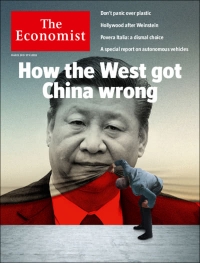 China’s model, which has brought more people out of poverty faster than any other system in history, continues to flourish, argues Wall Street executive Steven Rattner, a counselor in the Treasury Department under President Barack Obama. Meanwhile, liberal democracy is under pressure, most significantly for having failed in recent years to deliver broadly higher standards of living, he writes for the New York Times:
China’s model, which has brought more people out of poverty faster than any other system in history, continues to flourish, argues Wall Street executive Steven Rattner, a counselor in the Treasury Department under President Barack Obama. Meanwhile, liberal democracy is under pressure, most significantly for having failed in recent years to deliver broadly higher standards of living, he writes for the New York Times:
Don’t get me wrong. I’m not suggesting that we rewrite our Constitution to emulate China. And I certainly understand the loss of freedom and civil liberties under the Chinese system. But that doesn’t mitigate the need for us to get our government to perform the way it did in passing the New Deal and Lyndon Johnson’s Great Society.
We are in a new era of strategic competition and China’s communist autocracy is ideologically at odds with US democracy, notes the FT’s Martyn Wolf:
China’s rise has made the US fear the loss of its primacy…. What economists call “the China shock” has been real and significant, although trade with China has not been the main reason for the adverse changes experienced by US industrial workers. The US has also failed to provide the safety net or active support needed by affected workers and communities.
 But underlying trends suggest that the legitimacy of Communist rule remains fragile.
But underlying trends suggest that the legitimacy of Communist rule remains fragile.
The Economist has reported that the Communist Party “worries that Protestantism is spreading quickly among young, educated urbanites whose talents it needs to help modernize the country,” notes Carl Gershman, president of the National Endowment for Democracy, the Washington-based democracy assistance group. Its worries are well-founded, since “the religious awakening in China now seems uncontrollable,” according to a report last month, with polls showing that “more than 60% of Chinese university students in Beijing and Shanghai are eager to learn about Christianity.”

China Aid
This hunger for religion shouldn’t be surprising, given the death many decades ago of communist ideology and its replacement by an asphyxiating combination of cynical power worship, rampant materialism, massive corruption, environmental degradation and harsh repression that now passes for the “Chinese dream” in Xi Jinping’s dictatorial dystopia, he writes for the Washington Post, in an article based on a eulogy delivered at a memorial service for Li Baiguang (left) organized by China Aid.
Beyond its enduring primacy in Chinese politics, the other constant in the Communist Party is its Leninist core, STRATFOR adds. This structure was the secret behind the success of the former Soviet Union in the 20th century, and it’s the reason for what professor Andrew Nathan has called the “authoritarian resilience” of the Chinese Communist Party in the 21st century.
Yet today, after decades of collective leadership, Xi Jinping is taking. China back to personalistic leadership, analyst Susan Shirk writes for The Journal of Democracy.
 Last week, China announced that it was merging three national radio and television entities — China Central Television, China Radio International and China National Radio — to create a single “Voice of China” – a sign of Beijing’s coming propaganda offensive.
Last week, China announced that it was merging three national radio and television entities — China Central Television, China Radio International and China National Radio — to create a single “Voice of China” – a sign of Beijing’s coming propaganda offensive.
Recent developments have provided ample fodder for China to attack democracy and extol the one-party state, the Atlantic’s Benjamin Carlson reports.
The Chinese are enjoying a “golden field for their propaganda,” said Xu Guoqi, a professor at the University of Hong Kong.
“American power is based on two legs, the hard power and soft power,” Xu explained, arguing that the latter has been “really undermined… substantially,” giving the People’s Daily, the Communist Party mouthpiece, the occasion to run a series of commentaries arguing that the “crisis in capitalist societies” was “proof of the truth of Marxism and the superiority of the socialist system.”







